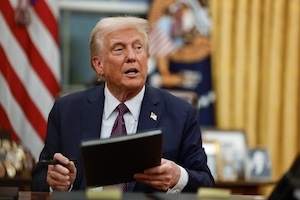U.S. Supreme Court Backs Trump, Allows Termination of Temporary Entry Permits for 500,000 Immigrants

On May 30, the U.S. Supreme Court ruled in favor of the Trump administration, allowing it to revoke temporary legal status granted to over 500,000 immigrants during the Biden administration. This decision reinforces the Court's support for Trump’s hardline immigration policies, although several justices expressed reservations about the manner of implementation.
According to international media reports, during his presidency, Joe Biden introduced a humanitarian parole program for citizens of Venezuela, Cuba, Haiti, and Nicaragua. Known as the CHNV program, it allowed a total of 30,000 people from these four countries to enter the U.S. each month for a period of two years, provided they passed security checks and had U.S.-based sponsors offering financial support. The Biden administration implemented this program as part of its efforts to reduce illegal border crossings from these countries.
On his first day in office, former President Donald Trump signed an executive order instructing the Department of Homeland Security (DHS) to terminate the program. In March, DHS announced the program’s termination. However, in early April, U.S. District Judge Indira Talwani in Massachusetts ordered a temporary halt to Trump’s executive action. The Trump administration then filed an emergency appeal with the Supreme Court, which on May 30 overturned the lower court's decision, enabling Trump to revoke the temporary legal status of migrants from the four countries.
Earlier in May, the Supreme Court had already agreed to allow the Trump administration to end the Temporary Protected Status (TPS) program for approximately 350,000 Venezuelans living and working in the U.S.
Out of the nine justices, Ketanji Brown Jackson and Sonia Sotomayor dissented. In her dissent, Justice Jackson wrote that the Court’s decision would “throw the lives of 500,000 people around us into chaos before their legal claims can be fully resolved.” Several immigrant rights groups and affected migrants have filed lawsuits against the Trump administration, arguing that deportation would expose them to "serious danger, persecution, or even death."
For decades, the U.S. has used humanitarian visa programs to admit immigrants fleeing war and turmoil, including Cubans in the 1960s. The Biden administration also launched a similar program in 2022 for Ukrainians fleeing the Russian invasion.
During his campaign, Trump pledged to deport millions of undocumented immigrants. In March of this year, he cited the 1798 "Alien Enemies Act" to deport Venezuelan gang members, sending them to a prison in El Salvador. The last time the U.S. invoked the Alien Enemies Act was during World War II, when it was used to detain and deport individuals of Japanese, German, and Italian descent.
- 75 reads
Human Rights
Fostering a More Humane World: The 28th Eurasian Economic Summi

Conscience, Hope, and Action: Keys to Global Peace and Sustainability

Ringing FOWPAL’s Peace Bell for the World:Nobel Peace Prize Laureates’ Visions and Actions

Protecting the World’s Cultural Diversity for a Sustainable Future

Puppet Show I International Friendship Day 2020

